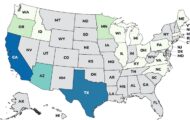Many people are rightly concerned about the spread of coronavirus, or 2019-nCoV, this new virus that causes symptoms similar to the flu. It is spreading rapidly, now in 28 countries and territories around the world, infecting more than 60,000 people as of today. Death rates are climbing. The vast majority of those cases, more than 59,000, are in China. But we wanted to know, can coronavirus be spread through food?

At this time, experts say no. There isn’t much that is known about this zoonotic virus, which experts think made the jump from animals to people, as also happened with SARS (Severe Acute Respiratory Syndrome) and MERS (Middle East Respiratory System). Viruses can also make the jump from people to animals.
It’s public health officials’ experience with those other outbreaks that make them think that transmission through food is unlikely. There has been no evidence of coronavirus spreading through contaminated food. Officials also don’t know if touching contaminated surfaces, then touching your mouth, nose, or eyes can transmit the virus.
Coronaviruses need a live host, either humans or animals, to grow. They cannot grow in food. The virus is spread via the person-to-person method (a person sneezes or coughs within 6 feet of another person), and between animals and people. The virus is breathed in through infectious droplets.
The virus may have originated in bats, which are eaten in some countries such as China, or may be associated with live markets, wet markets, or wildlife markets, meaning that meat sold in those markets is sold freshly slaughtered. The big risks for contracting coronavirus seems to be visiting those markets and living in countries where the virus is established.
So what about food? While there isn’t any evidence of the virus infecting anyone by eating food, it’s good to know that scientists say the SARS virus is destroyed when heated to a temperature of at least 140°F for 30 minutes. This may be the case with coronavirus.
As part of its recommendations to reduce the risk of transmission of emerging pathogens from animals to humans, the World Health Organization (WHO) says that when buying food from live, wet, or wildlife markets, “The consumption of raw or undercooked animal products should be avoided. Raw meat, milk or animal organs should be handled with care, to avoid cross-contamination with uncooked foods, as per good food safety practices.” WHO also says that people who work in slaughterhouses, veterinarians, and food inspectors should practice good personal hygiene, including frequent hand washing.
These are good recommendations for anyone who prepares food. Treat your food preparation as you always have, and should: wash your hands well before preparing food and after handling raw foods such as meats, poultry, and fish. Wash your hands well after blowing your nose, sneezing, or coughing, and after going to the bathroom. Don’t prepare food for others if you are sick. And always cook raw meats, poultry, and seafood to safe final internal temperatures, and check those temps with a reliable and accurate food thermometer. Every time.
If any food worker is sick, they should stay home until they are well. This is an issue in the U.S., where many food handlers work while they are sick, even though they should stay home, to avoid losing pay and because of restaurant rules. Many restaurants do not offer sick days or sick leave. Any worker who is sick with a respiratory or diarrheal illness should tell their employer.
Restaurant managers should make sure that their staff are appropriately trained in food hygiene, and that correct facilities, including sinks, soap, and towels, are available so the staff can practice good hygiene. And if a worker is sick, that person should be sent home.




